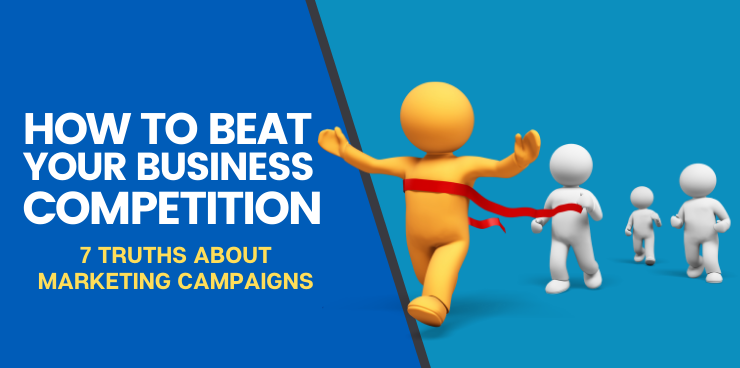You could be a business owner, a marketer or a key team member within an organization. No matter what your job title is, you know that new products introduce themselves to the market day in and day out.
Your marketplace evolves on a daily basis. Sometimes, you have to revamp your brand image or boost an existing product’s sales. Other times, your brand finds itself in the spotlight because of some unfortunate news or bad publicity.
You need marketing campaigns to extend your brand’s reach.
But there are some hidden truths about marketing that you don’t know.
What is a Marketing Campaign?
Let’s break down the term “marketing campaign” according to two definitions from Oxford Languages.
To summarize, marketing is when you or your company promotes and sells products or services. They do this through activities like market research and advertising.
A campaign is simply “an organized course of action to achieve a goal.”
So the basic definition of a marketing campaign would be any marketing activities that achieve company goals, right?
Well, sort of. But there’s more to it than that. After all, you know by now that there’s no room for relativity at the business dinner table. You have to get specific and turn goals into actionable items.
Thus, marketing campaigns use various media outlets to promote products. Some examples of marketing campaign media include:
- Television
- Radio
- Social media
Do not think of a marketing campaign as just an advertising campaign. In today’s modern market, campaigns often use interactive elements to engage customers.
If your business is part of a cutthroat market, you allot much of your marketing budget to your campaigns.
These types of competitive brands release campaigns often. The overarching goal is to boost brand awareness and drive sales. Once you identify your campaign’s goal, you know what type of media to use for it and how much marketing you need in general.
 The 12 Types of Marketing Campaigns
The 12 Types of Marketing Campaigns
We have 12 types of marketing campaigns to review here. Which one you use depends on your goal. Before you launch your campaign, also make sure you have a clear:
- Offer (what are you offering to your audience?)
- Audience (who is your target audience?)
- Message
1. Brand Awareness Campaign
The goal of a brand awareness campaign is straightforward. It is to spark conversation about your brand, like who you are and what you do as a company.
Brand awareness is not just about getting people to recognize your logo as soon as they see it. Rather, you want everyone who engages with your campaign to know specific information about your brand, such as:
- Business function
- Your voice or tone when you convey your messages
- Product or service quality
After an effective brand awareness campaign, your customers will know all there is to know about your brand the next time they interact with it. That shows them how you stand apart from your competitors.
2. Rebranding Campaign
It’s a new age in marketing. And each market changes regularly. You cannot expect to remain successful if your brand stays the same forever.
When you put forth a rebranding campaign, you secure your spot among your rivals.
You can use this type of marketing campaign when you:
- Need a product relaunch
- Make any significant organizational shift
- Change your brand values.
Keep in mind that rebranding campaigns are for significant changes. Do not put all of your team’s effort into one when you hire one new sales rep or update a small piece of information on your website. Instead, apply all of that effort when you need to revamp a popular product or excite customers about a culture shift.
3. Social Media Marketing Campaign
As you know, there are so many social media platforms it can be a bit hard to keep up. There’s Pinterest, Twitter, and Facebook. You have Snapchat, Instagram, and TikTok. The list goes on.
With that in mind, ensure you use the appropriate network for your target market. For example, say you run a media company that sells solutions for college-age journalism students. You might not want to market to men who are 55 and older with Facebook ads.
Also, consider your publication options. Do you want to use PPC ads for your campaign? Or would you prefer to use SEO for organic clicks?
4. User-Generated Content (UGC) Marketing Campaign
UGC marketing campaigns are a bit different than your traditional ones. The norm is when your business creates and publishes content. With UGC campaigns, your audience does that for you.
These campaigns build trust among your audience. A lot of the time, customers think that you do not care about them as people and you only want to get them to buy from you.
When your users take over, though, your potential customers feel more comfortable. Someone like them is telling them why your product is the best.
5. Email Marketing Campaign
Even if you have only been in the marketing business for a little while, you’ve seen an email marketing campaign. They’re some of the most popular ways to go about a campaign– and for good reason.
Almost 100 percent of adults use their email consistently. Teenagers are not far behind.
You are probably a participant in email marketing campaigns outside of work, too. For example, you may get event updates from a company because you are on their email list.
6. Product Launch Campaign
Whether you’re part of a new or established company, product launch campaigns are important.
When you have a new or improved product, ensure you introduce it to the right market. Then, you have to generate excitement from your target buyers. Get them talking and they will help you drive sales.
7. Referral Marketing Campaign
These campaigns reward your buyers if they refer friends or family to your brand and its products or services.
They are effective because again, most people trust their peers and loved ones more than a sales-driven company. You can also expand your reach this way.
8. SEO Campaign
Search engine optimization is the organic way to increase site traffic. Instead of paying for your ads, you use metadata, keywords, and more to boost your search engine rankings.
9. Partner Marketing Campaign
You cannot argue that it’s better to have two sources of knowledge and experience than one. That’s where partner marketing campaigns come in.
Use your resources if you have a non-competing business at your disposal. You two can partner up to market a product or service to kindred target markets.
10. Conversational Marketing Campaign
These campaigns custom-fit your website experience for individual buyers.
Conversational marketing uses chatbots to engage customers. These bots support them with an easy, personable approach.
11. Influencer Marketing Campaign
These are an elevated form of referral marketing campaigns. Sales companies, especially indirect sales, take advantage of well-known social media influencers. The influencer recommends your product or services within their network.
12. Video Marketing Campaign
There are a lot of ways you can create video content today. Video marketing takes into account those in your audience who don’t want to spend a lot of time reading copy.
It is a great strategy to boost both product sales and brand awareness.
The Truth About Marketing Campaigns
Marketing matures all the time, but the chaos of 2020 shifted the culture even more.
That led to a shift in the way you have to market to your target audience. That is because of seven new truths about marketing campaigns.
Truth 1: Customer Expectations Are Always On the Rise
Your brand values are moot if they do not reflect buyer expectations.
After 2020, your competition kicked things up several notches. Customers noticed that. Now, they expect:
- A seamless shopping experience
- Brands who anticipate their needs before they even know what their needs are
- Suitable solutions to their specific problems
- A genuine connection
And above all, they expect you to keep up with their rising expectations. They know what they want and when they want it. If you can’t face that and provide for their desires, they move on to the next.
Data analysis and technological advances help here. They help you bring your customers a relevant experience in way less time. Use it to tailor your four Cs to them:
- Content (online)
- Commerce (through inside sales, an unforgettable experience at a flagship store, or both)
- Community
- Convenience (think of loyalty or rewards programs and coupons or sales
Truth 2: You Cannot Start Marketing Until You Know Your Customer Segment
Do not generalize when you communicate with your customers. You have to know the tiniest details about your customer segment to know what they care about and want to see from your business.
Be specific to find your segment. Where do they live? What country, state, city or town do they live in? Which location do they shop at the most if they shop in person?
What are their personal core values and lifestyle situations? What are their characteristics and attitudes like? First, you have to understand their buying behaviors. Your marketing campaigns have to reinforce those values.
Do they want an eco-friendly line? Do they prefer affordable or health-centric products?
Shape your campaign to your segment and be there for their whole journey.
Truth 3: You Are Always in Competition With Your Customer’s Best Experiences
You used to think your top competition was your business rival. Now, you know that it’s your customer and their latest top experiences.
They shop with brands that personalize their experience to the nth degree. After 2020, buyers know that their e-commerce affairs are focused on them, specifically.
To compete with their best experiences, analyze real-time data for brand-score KPIs. Support your buyer journeys. Also, streamline all of your internal departments so they can mesh company goals with custom ones.
Truth 4: You Have to Know How to Court Customers Online
Stop being a playboy with your customers. You cannot go on endless blind dates with the same approach over and over with the hope that you’ll find as many customers as possible.
Think about online courting instead. It’s an algorithm that you can use to generate the right leads, not just a lot of leads. Use performance and brand marketing together.
Truth 5: Customer Relationships Matter More Than Anything Else
Be trustworthy. That is the first step in building relationships with your customers.
And guess what? There is nothing more important than those relationships.
In 2020, customers found solace in their relationships with brands. If you are in B2B sales, that desire for a brand relationship increases even more. To build trust, listen to customer feedback and do something about it. Be genuine and provide solutions as answers.
This is one of the many reasons you need top talent on your sales team. You need to frame your business around insightful solutions. They hear the customer feedback and match it with an actionable answer.
Trust values relationships. All parts of your company must value and build upon customer relationships.
Truth 6: Modern Marketing Fails Without the Perfect Balance
You need to feed modern marketing a balanced diet. And both you and every internal staff member need to understand why each food group in the diet matters.
This balance includes:
- A success-focused tech stack
- Results-driven use cases
- A roadmap to human enablement
Prioritize human enablement. Your workers have to know how to use your tech stack to its fullest potential. Different tools are appropriate for different departments. Project management is not completely the same as a customer success manager, so their tools shouldn’t be either.
Make sure that you measure their success rates, too. Otherwise, you don’t know if your ROI is appropriate.
 Truth 7: Your Brand Values Must Be at the Core of Everything
Truth 7: Your Brand Values Must Be at the Core of Everything
Consumers are hyper-aware of their own values. Loyal customers choose brands that stand by their own core values.
2020 gave buyers more time and reason to investigate the companies they shopped with. Cost-effective and convenient solutions are of course still important. However, they now focus more on brand values like:
- Trustworthiness and transparency
- Ethical and sustainable sourcing
- Social responsibility
So build your marketing campaigns on your brand values. Educate your audience about them. Make sure your values are genuine.
Conclusion
There are a lot of key takeaways here. But above all, know that your customers are the name of the game.
Question: How can you improve your sales training and recruit top talent who keeps that customer success at the forefront of their mind?
Answer: With Selling Revolution.
We stand out as the authority on selling success with long-term results. And we know that you’re ready to stand out, too.
For more help with big-ticket items like marketing campaigns, click here. To improve your sales and secure your spot as a top-selling business, book a call with us right now.


 The 12 Types of Marketing Campaigns
The 12 Types of Marketing Campaigns
 Truth 7: Your Brand Values Must Be at the Core of Everything
Truth 7: Your Brand Values Must Be at the Core of Everything